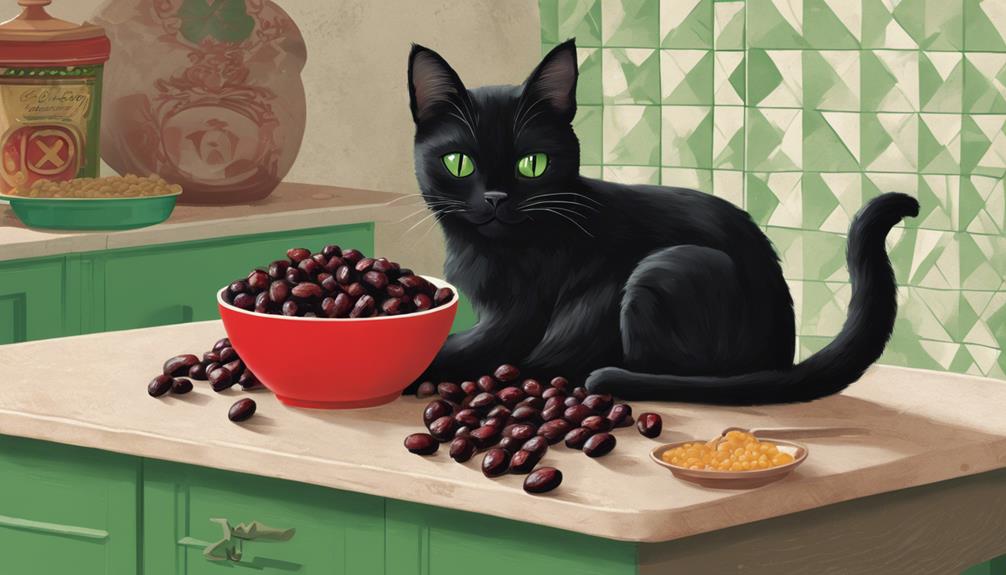When it comes to cats and raisins, it’s important to avoid them! Raisins are toxic to cats, leading to symptoms such as vomiting, diarrhea, and kidney failure. If your cat happens to eat raisins, take them to the vet immediately for treatment. Vomiting may need to be induced, and IV fluids might be required for severe cases. Avoid letting your cat come into contact with raisins at all costs. Monitor their food intake, check labels carefully, and keep raisin snacks out of reach. Remember, a diet free of raisins is crucial for your cat’s safety and well-being. Keep your furry friend safe by preventing access to raisins. Your cat’s health should always be your top priority.
Key Takeaways
- Keep cats away from raisins to prevent toxicity.
- Monitor cat food and treats for raisin ingredients.
- Supervise meal times to avoid raisin ingestion.
- Store raisin-containing foods securely out of reach.
- Ensure a raisin-free diet for cat safety and health.
Risks of Feeding Cats Raisins
Feeding cats raisins poses significant risks due to their toxicity, causing symptoms like vomiting, diarrhea, lethargy, and potentially leading to kidney failure. Raisins are extremely toxic to cats, and even a small amount can trigger adverse reactions. It's vital to understand the seriousness of raisin poisoning in cats, as it can swiftly progress to kidney failure, endangering your feline companion's health.
The exact mechanism behind raisin toxicity in cats remains unclear, underscoring the importance of prevention. If your cat ingests raisins, immediate veterinary care is essential to mitigate the harmful effects. To safeguard your pet, it's best to avoid giving raisins entirely. By steering clear of this hazardous food item, you can protect your cat from the dangers associated with raisin consumption. Prioritizing your cat's well-being involves making informed choices about their diet, steering clear of potential threats like raisins.
Symptoms of Raisin Toxicity in Cats
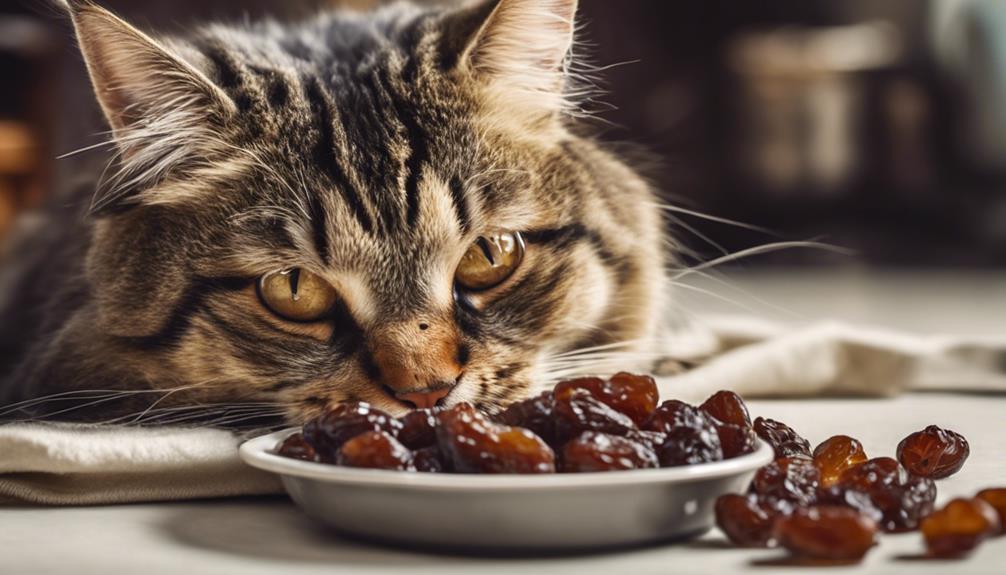
After discussing the risks associated with feeding cats raisins, it's important to recognize the symptoms of raisin toxicity in cats. If your feline friend has ingested raisins, keep a close eye out for signs such as vomiting, diarrhea, lethargy, weakness, and loss of appetite. Cats may also exhibit increased thirst, frequent urination, and abdominal pain.
In severe cases, they might struggle to produce urine due to raisin poisoning. It's vital to act swiftly and seek veterinary assistance if you notice any of these symptoms. Monitoring for signs of kidney failure, like dehydration and tremors, is essential post-raisin ingestion.
Why Raisins Are Harmful to Cats
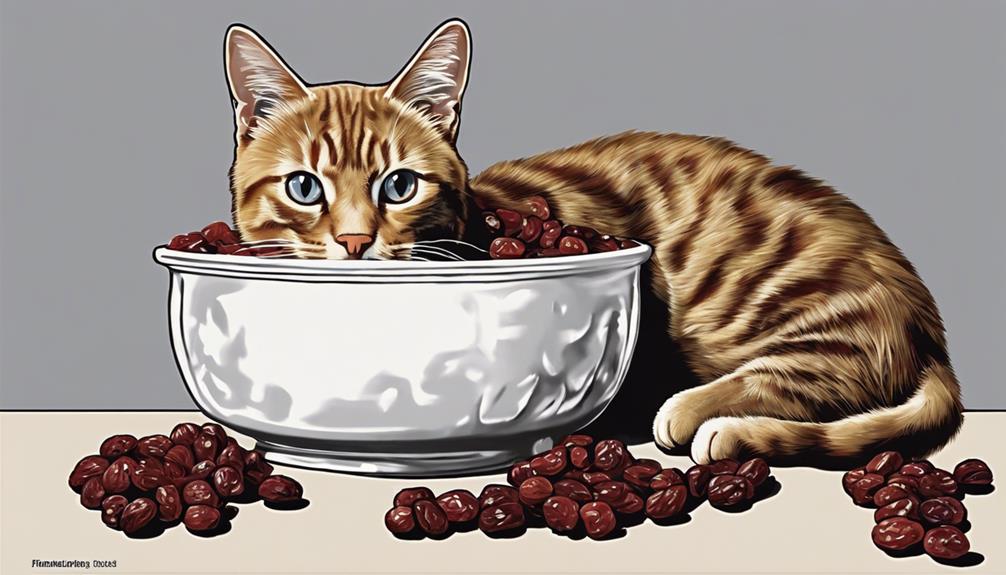
Raisins pose a significant danger to cats due to their toxic properties that can lead to kidney failure. Grapes and raisins contain substances that are harmful to cats' kidneys, even in small quantities. To emphasize the dangers of raisins for cats, consider the following:
- Essential Compounds: Raisins contain toxic compounds that can be extremely harmful to a cat's kidneys.
- Critical Failure Risk: Ingesting raisins can increase the risk of kidney failure in cats, which can have severe consequences.
- Unknown Mechanism: The exact mechanism behind how grapes and raisins cause toxicity in cats isn't yet fully understood.
- Adverse Symptoms: Cats that consume raisins may exhibit symptoms such as vomiting, diarrhea, lethargy, and increased thirst.
Understanding the potential risks associated with raisin ingestion in cats is vital for ensuring their well-being. If you suspect your cat has eaten raisins, seeking immediate veterinary care is essential to prevent serious health issues.
Detecting Raisin Ingestion in Cats

When it comes to detecting raisin ingestion in cats, it's important to watch out for symptoms like vomiting, diarrhea, lethargy, and kidney issues.
If your cat shows signs of weakness, loss of appetite, or increased thirst, it's vital to act promptly.
Symptoms of Ingestion
Detecting raisin ingestion in cats can be important for ensuring prompt veterinary care and preventing serious health complications. Cats that have ingested raisins may exhibit symptoms such as vomiting, diarrhea, lethargy, weakness, and loss of appetite. Additionally, they might show signs of increased thirst and urination.
Some cats could experience abdominal pain and difficulty urinating after consuming raisins. It's essential to monitor for symptoms like weakness, dehydration, and kidney-related issues following raisin ingestion. If you notice any of these signs in your cat, contacting a veterinarian immediately is necessary for their well-being.
Immediate Veterinary Care
If your cat has potentially ingested raisins, immediate veterinary attention is crucial to prevent serious health complications. Contacting a veterinarian promptly is vital when a cat consumes raisins as these can cause vomiting and even lead to kidney failure.
The sooner the cat receives medical care, the better the chances of preventing severe consequences. When you suspect raisin ingestion, it's important to provide the vet with details like the amount ingested and the time of consumption. This information aids in diagnosing the issue accurately and determining the appropriate treatment.
Veterinarians may induce vomiting, administer activated charcoal, and offer supportive care to mitigate the risks associated with raisin exposure. Remember, acting promptly can make a significant difference in your cat's well-being.
Potential Health Risks
Regularly monitoring your cat for symptoms of raisin ingestion is vital for early detection and timely treatment. Cats may display signs such as vomiting, diarrhea, lethargy, and weakness after consuming raisins.
Detecting raisin ingestion in cats involves observing indicators like loss of appetite, increased thirst, and abdominal pain. Raisin poisoning can potentially lead to kidney failure in cats, underscoring the importance of prompt detection for their well-being.
If you suspect your cat has ingested raisins, immediate veterinary care is essential to prevent serious health complications. By closely monitoring your feline companion for symptoms of raisin ingestion, you can aid in early detection and guarantee timely intervention to safeguard their health.
Immediate Actions for Raisin Ingestion
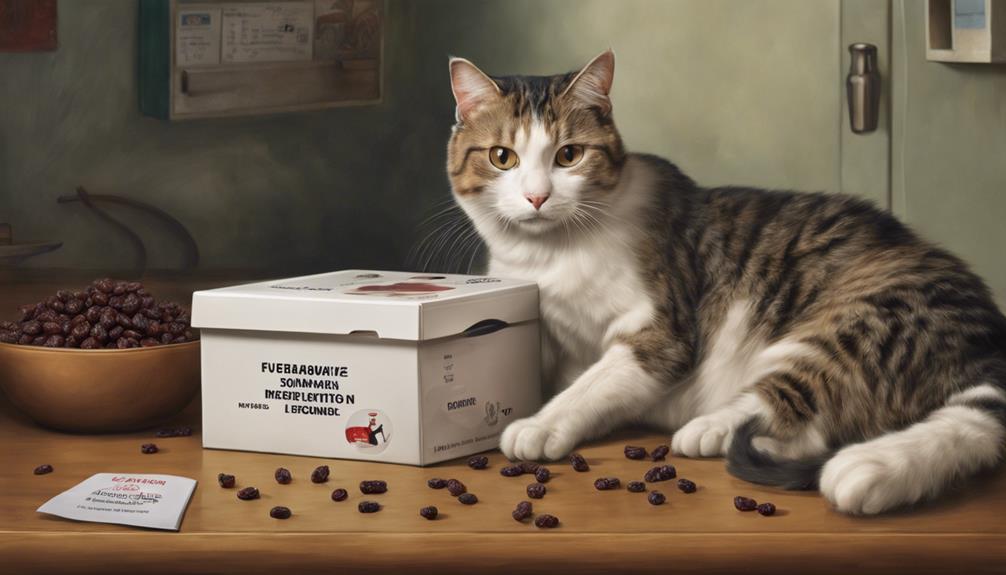
Upon discovering that a cat has ingested raisins, immediate action by contacting a veterinarian is vital for proper guidance and treatment. Cats are at risk of kidney failure from raisin ingestion, making prompt intervention essential.
When reaching out to the veterinarian, provide important details such as the quantity of raisins consumed and the timeframe of ingestion. Veterinarians may recommend inducing vomiting or administering activated charcoal to help counteract the effects of poisoning.
In severe cases, where kidney failure is a concern, hospitalization, IV fluids, and close monitoring are necessary for the cat's well-being. Remember, time is of the essence in these situations, so don't hesitate to seek professional help promptly.
Your quick response could make a significant difference in your cat's recovery process. Stay vigilant and prioritize your feline friend's health by acting swiftly when raisin ingestion occurs.
Risks of Raisin Poisoning in Cats

Raisins pose a significant risk of toxicity to cats, potentially leading to symptoms like vomiting, diarrhea, lethargy, and even kidney failure. Even a small intake of raisins can have serious consequences for feline health, making it imperative to act promptly if ingestion occurs.
Immediate veterinary attention is vital in cases of raisin ingestion to prevent life-threatening complications and safeguard your cat's well-being.
Raisins and Cat Toxicity
Numerous cases have highlighted the dangers of raisin poisoning in cats, emphasizing the critical need for awareness and prevention strategies. Raisins are toxic to cats, posing a severe risk of kidney damage. If you suspect grape toxicity in your feline friend, it's vital to act promptly.
Remember these important points:
- Raisins can cause symptoms of kidney failure in cats.
- Grapes, currants, and sultanas are equally harmful to felines.
- Signs of kidney issues should never be ignored.
- Contact your veterinarian immediately if your cat ingests raisins to prevent severe consequences.
Protect your furry companion by keeping raisins and related fruits out of their reach and seeking veterinary help promptly if ingestion occurs.
Symptoms of Poisoning
Experiencing symptoms of raisin poisoning in cats can be alarming, as they may include vomiting, diarrhea, lethargy, weakness, and loss of appetite. Cats exposed to raisins might also exhibit increased thirst, urination, and abdominal pain. In severe cases, kidney failure can occur, leading to the inability to produce urine. If your cat shows any signs of raisin poisoning, prompt veterinary care is vital. Monitoring for symptoms like dehydration and kidney dysfunction is essential in cases of raisin ingestion. Below is a table summarizing the symptoms associated with raisin poisoning in cats:
| Symptom | Description |
|---|---|
| Vomiting | Expelling stomach contents forcefully |
| Diarrhea | Loose or watery stools |
| Lethargy | Lack of energy and enthusiasm |
| Weakness | Reduced strength or vigor |
| Kidney Failure | Inability of the kidneys to function properly |
Treatment Options Available
Our priority when addressing cases of raisin poisoning in cats is to promptly initiate treatment options to mitigate the risks associated with kidney failure.
Treatment for cats exposed to raisins may involve the following steps:
- Inducing vomiting: This helps remove any remaining raisins from the stomach.
- Administering activated charcoal: This aids in absorbing the toxins present in the digestive system.
- Providing IV fluids: Essential for maintaining hydration and supporting kidney function.
- Hospitalization and intensive monitoring: Severe cases of raisin poisoning may necessitate close observation and additional treatments to prevent kidney failure.
These interventions are vital in managing raisin poisoning in cats and improving their chances of a successful recovery.
Handling Raisin Consumption in Cats

When addressing raisin consumption in cats, prompt action is essential to safeguard their well-being due to the potential toxicity associated with this food item. If a cat has ingested raisins, it's important to understand that even a small amount can be harmful, potentially leading to kidney failure.
The toxic dose can vary between individual cats, making it tricky to determine a safe amount. Hence, immediate veterinary care is necessary to assess the situation and provide appropriate treatment.
Symptoms of raisin toxicity in cats may include vomiting, diarrhea, lethargy, lack of appetite, and increased thirst and urination. These signs should never be ignored, as they could indicate a serious health issue.
The exact mechanism of raisin toxicity in cats isn't entirely understood, further emphasizing the significance of seeking professional help.
Treatment Options for Raisin Ingestion

In cases of raisin ingestion by cats, prompt veterinary intervention is essential for ensuring the best possible outcome. If your feline friend has consumed raisins, here are some treatment options that may be considered:
- Inducing Vomiting: This may be necessary to remove raisins from the cat's stomach promptly.
- Activated Charcoal: Administering activated charcoal can help absorb any remaining toxins from the raisins.
- IV Fluid Therapy: In severe cases of raisin ingestion, hospitalization for IV fluid therapy might be required to support kidney function and hydration.
- Blood Tests: Regular blood tests are critical to monitor kidney function and assess potential damage caused by raisin poisoning.
Recovery Process for Cats After Raisins

Supportive care plays an essential role in aiding cats' recovery after ingesting raisins. When a feline friend has consumed raisins, prompt action is important to prevent kidney damage. Monitoring kidney function through blood tests is vital during the recovery process. IV fluids are commonly administered to flush out toxins and support kidney function, aiding in the elimination of harmful substances from the body.
To provide a clearer picture, here is a table outlining key aspects of the recovery process for cats after raisin ingestion:
| Aspect | Importance |
|---|---|
| Supportive Care | Crucial for aiding recovery and managing kidney damage |
| Blood Tests | Essential for monitoring kidney function |
| IV Fluids | Administered to flush out toxins and support kidneys |
Preventing Raisin Toxicity in Cats
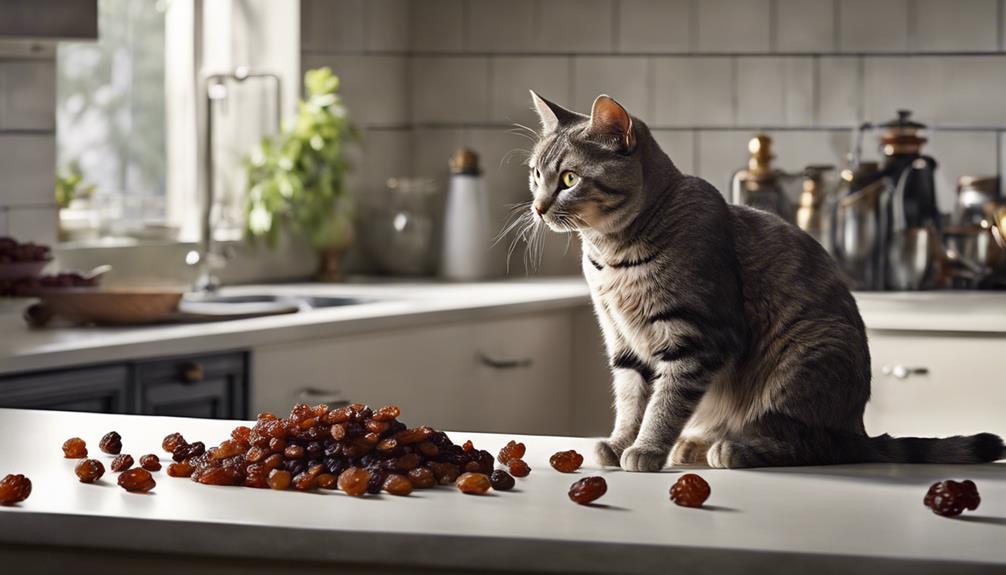
After a cat has ingested raisins, preventing raisin toxicity becomes paramount to safeguarding their health and well-being. Here are some essential tips to help keep your feline friend safe from the dangers of raisins:
- Avoidance is Key: The best way to prevent raisin toxicity in cats is by ensuring that they don't have access to raisins or any foods containing raisins.
- Immediate Veterinary Attention: If you suspect that your cat has consumed raisins, seek immediate veterinary care to reduce the risk of kidney failure and other severe health issues.
- Monitor for Symptoms: Keep an eye out for symptoms of raisin toxicity such as vomiting, diarrhea, lethargy, lack of appetite, and increased thirst and urination.
- Educate Others: Make sure that everyone in your household is aware of the dangers of raisins for cats and knows not to feed them any foods containing raisins.
Understanding Raisin Dangers for Cats
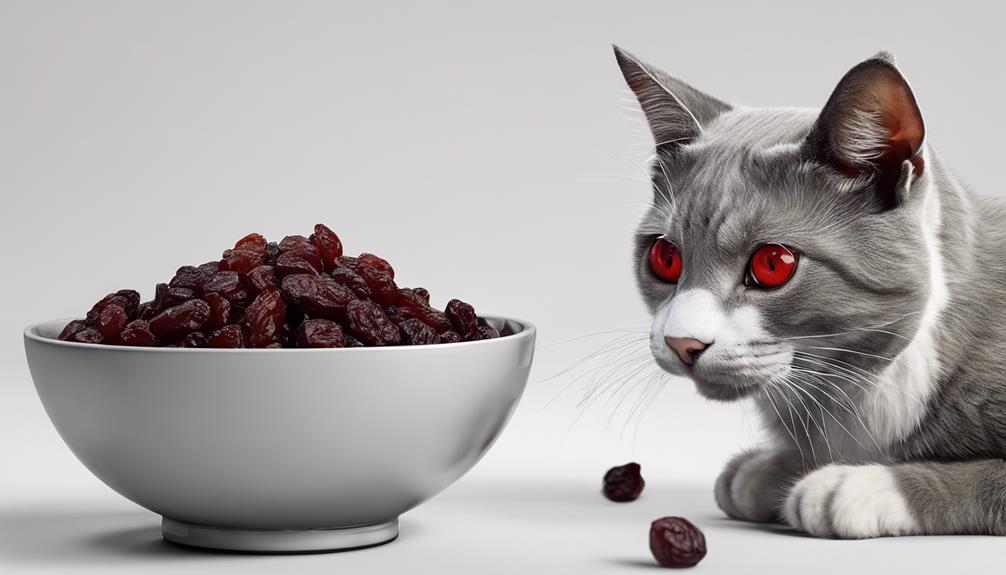
To comprehend the risks raisins pose to cats, it's vital to grasp their potential for causing kidney failure and other serious health complications. Raisins, along with grapes, contain substances that can be highly harmful to cats. If a cat ingests raisins, it can lead to severe kidney damage, sometimes resulting in kidney failure. The symptoms of raisin poisoning in cats may include vomiting, diarrhea, lethargy, and abdominal pain. It's essential to act swiftly if you suspect your feline friend has eaten raisins, as immediate veterinary care is necessary to address the potential toxicity and prevent further harm.
Anecdotal reports have highlighted cases where cats developed kidney failure after consuming raisins. This underscores the importance of keeping raisins and raisin-containing products far away from your cat's reach. By understanding the dangers associated with raisins and being vigilant about what your cat has access to, you can help safeguard their health and well-being.
Safe Alternatives to Raisins for Cats

When considering safe alternatives to raisins for cats, prioritizing their nutritional needs is essential. Here are some options to make sure your feline friend stays happy and healthy:
- Cat-safe treats: Choose treats specifically formulated for cats, ensuring they meet their dietary requirements.
- Cooked lean meats: Foods like chicken or turkey can be a tasty substitute for raisins, providing protein and essential nutrients.
- Catnip or cat grass: These can help keep your cat entertained and satisfied, offering a fun distraction from raisins.
- Commercial cat treats: Opt for commercially available cat treats or freeze-dried meat treats as a safe and delicious alternative to raisins.
Risks of Cats Consuming Raisins

Ingesting raisins poses a serious risk of kidney failure to cats due to their toxicity. These tiny fruits might seem important, but even a small amount can have severe consequences for your feline friend.
If your cat accidentally consumes raisins, be on the lookout for symptoms like vomiting, diarrhea, lethargy, and increased thirst. These are red flags that shouldn't be ignored. Immediate veterinary care is vital in such situations to prevent life-threatening complications.
Remember, when it comes to raisins and your cat, prevention is key. Keep all raisin-containing products out of reach to avoid any chance of poisoning. Your cat's health and well-being are top priorities, so it's best to play it safe.
Be proactive in safeguarding your furry companion from the dangers of raisins, and always have a raisin-free environment for your beloved pet.
Importance of Raisin-Free Diets for Cats

Raisins are extremely harmful to cats and can present grave health risks. Even a small quantity can result in kidney failure and other severe problems.
It's vital to uphold a raisin-free diet for cats to guarantee their safety and well-being.
Raisins Are Toxic
To safeguard your feline companion's health, it's essential to eliminate raisins from their diet completely due to their toxic nature. Raisins can lead to severe kidney failure in cats, even in small amounts. If your cat ingests raisins, watch out for symptoms like vomiting, diarrhea, lethargy, lack of appetite, and increased thirst and urination. Immediate veterinary care is vital to prevent serious complications. Keeping raisins away from your cat is the best way to maintain their health and well-being.
- Raisins can cause kidney failure in cats.
- Even small amounts can be harmful.
- Look out for symptoms like vomiting and lethargy.
- Quick veterinary care is essential if ingestion occurs.
Health Risks for Cats
Let's guarantee our feline friends stay healthy by understanding the risks associated with including raisins in their diet. Raisins can be toxic to cats, potentially leading to kidney failure. If a cat ingests raisins, symptoms such as vomiting, diarrhea, lethargy, and loss of appetite may occur, indicating the need for immediate veterinary care to prevent severe health issues like kidney failure. To emphasize the importance of a raisin-free diet for cats, here is a table summarizing the risks:
| Risk Factor | Description |
|---|---|
| Toxicity | Raisins can be toxic to cats. |
| Symptoms | Vomiting, diarrhea, lethargy, loss of appetite. |
| Veterinary Care | Immediate care is vital if ingestion occurs. |
| Kidney Failure | Can result from raisin consumption. |
| Prevention | Avoiding raisins is essential for cat health. |
Monitoring Cats Food for Raisins
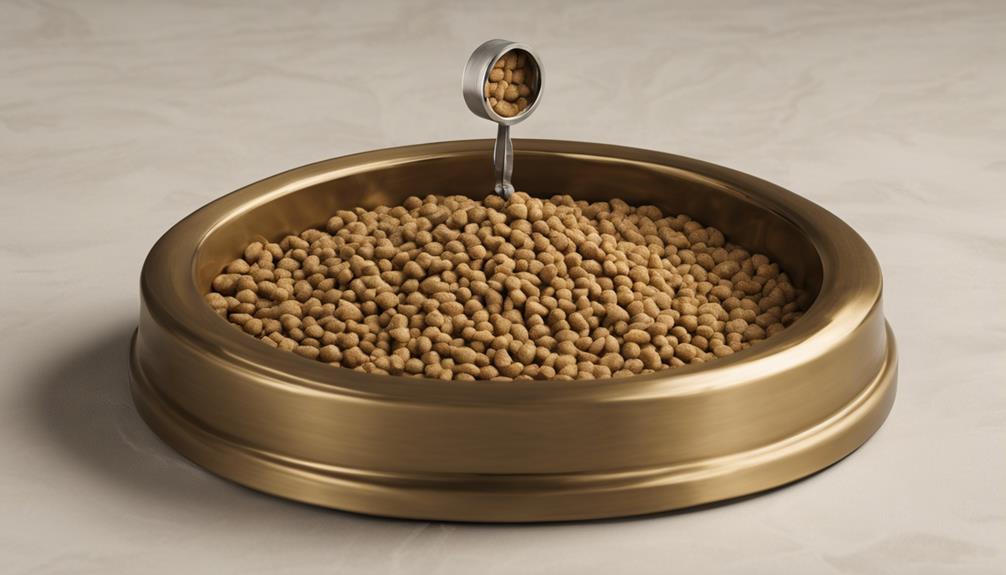
We consistently verify the ingredient labels on all cat food and treats to make sure they're free of raisins. Monitoring our cats' food for raisins is essential in keeping them safe and healthy.
Here are some practical tips to help guarantee our feline friends steer clear of this harmful ingredient:
- Check labels: Always inspect the ingredient labels on cat food and treats for any presence of raisins.
- Supervise meals: Keep a watchful eye on our cats during meal times to prevent them from accessing any raisin-containing foods.
- Store securely: Store human snacks or baked goods with raisins in a secure place out of reach of curious cats.
- Be cautious: When preparing meals that include raisins, take extra care to avoid any accidental ingestion by our feline companions.
Frequently Asked Questions
What Happens if My Cat Eats 1 Raisin?
If our cat consumes one raisin, immediate veterinary care is crucial. Even a small amount can result in serious symptoms like vomiting, diarrhea, and kidney failure. Keeping raisins away from cats guarantees their well-being.
How Do You Treat Raisin Poisoning in Cats?
We induce vomiting to eliminate toxins, administer activated charcoal to absorb any remaining substances, and provide IV fluids if needed. Blood tests are conducted to monitor kidney function until it normalizes. Veterinary care is essential.
How Many Raisins Can a 100 Lb Dog Eat?
Like a hidden danger in plain sight, the toxicity of raisins for a 100 lb dog remains a serious concern. Even a small amount can harm them, so it's important to keep all raisin products away.
Can Cats Eat Yogurt Covered Raisins?
We shouldn't give cats yogurt-covered raisins. These treats are harmful and can cause digestive issues in felines. It's best to avoid sharing any raisin products with our cats to keep them safe and healthy.
Are Raisins and Cherries Safe for Cats to Eat?
Raisins and cherries are not safe for cats to eat. In fact, it’s important to avoid safely feeding cats cherries or any dried fruits, as they can be toxic and lead to kidney failure. Stick to cat-friendly treats to keep your feline friend healthy and happy.
Conclusion
In safeguarding cats' well-being, avoid raisins in their dish. Remember, raisins can pose a danger to feline companions. Opt for secure substitutes to prevent any accidents.
Let's guarantee our fluffy friends have a raisin-free diet for their health. Stay attentive and supervise their food to avoid any unintentional consumption.
Stay wise, stay cautious, and say no to raisins for your cat's sake!
